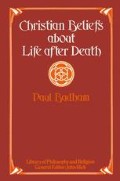Abstract
What is it that constitutes my personal identity? That is the major question facing any speculation about a possible future life. If my selfhood is necessarily dependent on bodily continuity, then there seems no sense in which my conscious personal self could exist after the cremation and scattering of my corpse. On the other hand if Descartes was right in arguing that ‘This I, that is to say, the mind, by which I am what I am, is entirely distinct from the body’,1 then this fundamental objection to belief in life after death is removed. Let us therefore examine the arguments which led Descartes to this conclusion.
Access this chapter
Tax calculation will be finalised at checkout
Purchases are for personal use only
Preview
Unable to display preview. Download preview PDF.
Notes
René Descartes, Discourse on Method (Penguin, 1968) p. 54.
A. J. Ayer, Language, Truth and Logic (Gollancz, 1964 ) pp. 46–7.
Bertrand Russell, History of Western Philosophy (Unwin, 1961) p. 550.
F. C. Copleston, A History of Philosophy (Image, 1963 ) IV 106.
A. Flew, Body, Mind and Death (Macmillan, 1964 ) p. 189.
P. F. Strawson, Individuals (Methuen, 1965 ) p. 95.
Walpola Rahula, What the Buddha Taught (Gordon Fraser, 1967) p. 26.
A. J. Ayer, The Problem of Knowledge (Penguin, 1964) pp. 46–7.
William Kneale, On having a Mind (CUP, 1962) p. 50.
Terrence Penelhum, Survival and Disembodied Existence (RKP, 1970) p. 86.
Peter Geach, God and the Soul (RKP, 1969) p. 27.
John Hick, The Resurrection of the Body (an unpublished paper, 1973).
Gilbert Ryle, The Concept of Mind (Penguin, 1966) pp. 47–8.
H. D. Lewis, The Elusive Mind (Unwin, 1969 ) pp. 50–1, 34–5.
John Hick, Biology and the Soul (CUP, 1972) p. 25.
J. N. D. Kelly, Early Christian Doctrines (Black, 1960) p. 345; Augustine, City of God II 22/4 II 22/4.
Author information
Authors and Affiliations
Copyright information
© 1976 Paul Badham
About this chapter
Cite this chapter
Badham, P. (1976). A Defence of the Concept of the Soul. In: Christian Beliefs About Life After Death. Library of Philosophy and Religion. Palgrave Macmillan, London. https://doi.org/10.1007/978-1-349-03013-2_6
Download citation
DOI: https://doi.org/10.1007/978-1-349-03013-2_6
Publisher Name: Palgrave Macmillan, London
Print ISBN: 978-1-349-03015-6
Online ISBN: 978-1-349-03013-2
eBook Packages: Palgrave Religion & Philosophy CollectionPhilosophy and Religion (R0)

